-
Fransiz ressam Julie Manet'nin olum yildonumu (14 Temmuz 1966)
Le jardin fleuri, 1890 1905
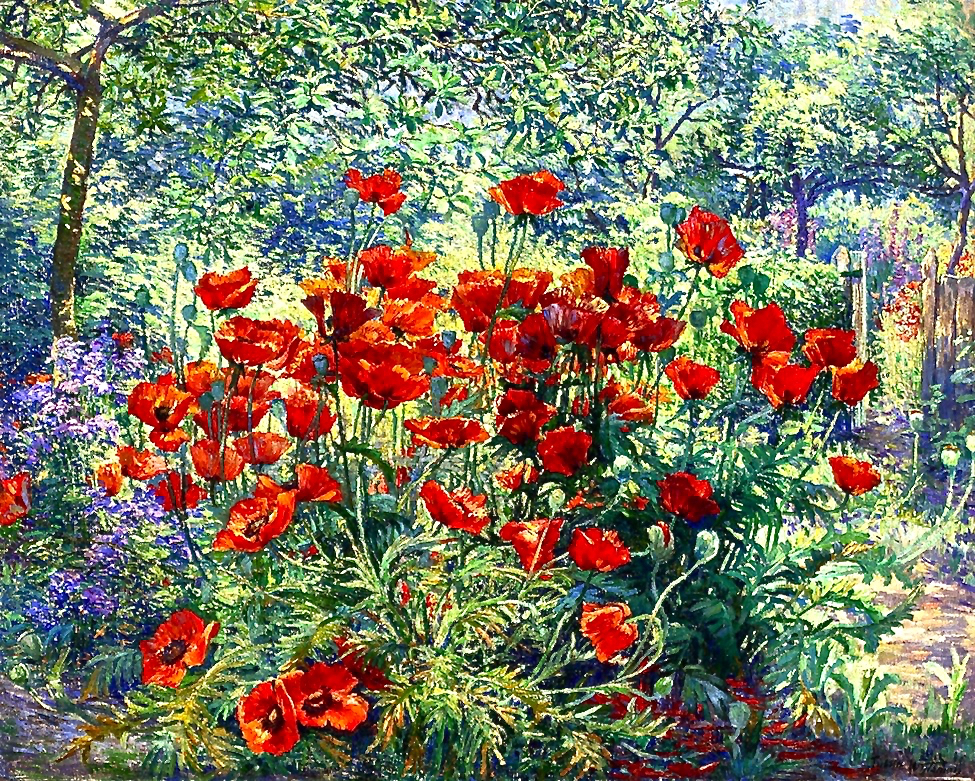
Spirées, XIX e siecle
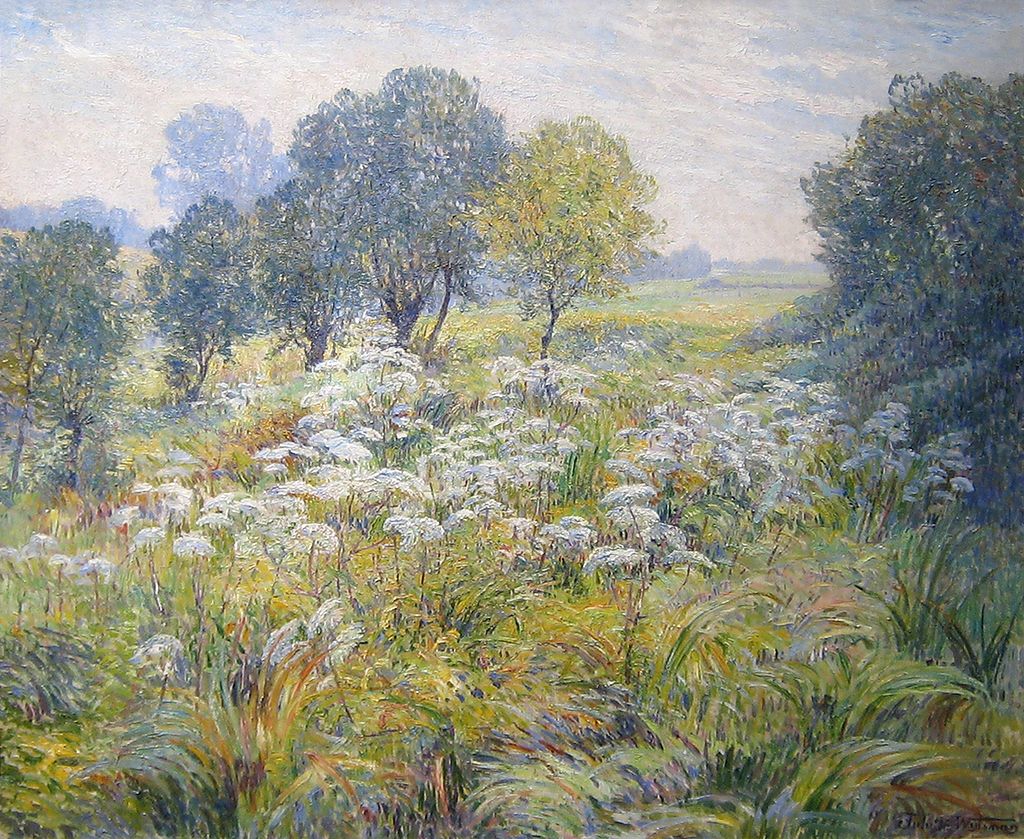
-
Rumen sair ve cocuk edebiyati yazari Tudor Arghezi'nin olum yildonumu (14 Temmuz 1967)
Duvardaki ciplak hucrenin sivasina
Tirnaklarimla yazdim
Karanliklarda yalnizligimla
Ne boga, ne aslan, ne de kartal
Yardima kosamadilar
Onlar cevreyi duzelttiler, taradilar
Luka icin, Marku icin, Joan icin
Bunlar yassiz dizelerdir
Cukur yirlari
Gunun kosuklari
Simdi gokce tirnaklarim kor olunca
Saliverdim buyusnler diye
Ve buyumediler
Buyuseler de belki duyamazdim
Karanlikta, yagmur uzaktan geliyor
Parmaklarim aciyordu bir pence gibi
Ve hic yumruk olmuyordu
O vakit sol elimin tirnaklariyla yazdim.

I wrote it with my fingernail in mortar,
In an empty blockout wall,
In the dark, alone, unaided by
Neither bull, nor lion, nor eagle
That aided
Luke, Mark and John.
There are verses without year.
Verses of the pit,
Verses for thirst,
And for hunger and ashes.
Verses of the now.
When my angelic nail got blunt I let it grow.
Yet, never had it grown
Or I have never known if it had grown.
It was dark. Outside the rain was churning in the distance.
And my hand was in pain, just like a claw
Powerless to clench it in a fist,
So I had forced myself to write with nails of my left hand.
-
1965'te Nobel Edebiyat Odulu'ne aday gosterilen Rus - Sovyet yazar Konstantin Georgiyevich Paustovsky'nin olum yildonumu (14 Temmuz 1968)
"Ekim ayi her zamankinden cok daha soguk ve yagmurluydu. Evlerin ahsap catilari da kararmisti.
Bahcedeki birbirine karismi otlar artik iyice yerlere yatmisti. Sadece citin dibindeki acilmamis kucuk gunebakan bir turlu yapraklarin dokemiyordu.
Nehrin arkasindan cayirligin uzerinden sogutlere ilise ilise parcali bulutlar surukleniyordu. Yagmur bulutlardan asagiya sirnasikca iniyordu.
Yollarda yurumek de, aracla gecmek de artik imkansizdi. Cobanlar bile artik suruleri cayirlara surmeyi birakmislardi.
Cobanin kavali da ilkbahara kadar susmustu. Katerina Petrovna icin sabahlari kalkip da her gun ocagi yakilmamis sobalarin agirlasmis kokulu odalari tozlanmis 'Vestnik Yevropi' dergisi, masada sararmis fincanlari, uzun zamandir temizlenmemis semaveri ve duvarlardaki resimleri gormek daha da agir gelmeye basladi. Belki, odalar karanlik icindeydi ve Katerina Petrovnanin gozleri kara sularla dolmustu. Belki de resimler eskiliginden dolayi solmuslardir ve resimlerden artik hicbir sey anlasilmıyordu. Katerina Petrovna sadece aklinda kaldigiyla hatirliyordu: Bu, babasinin portresiydi; bu da kucuk, altin cercevedeki Kramskinin hediyesi, onun 'Bilinmeyen' isimli calismasinin eskizidir. Katerina Petrovna unlu bir ressam olan babasinin yapmis oldugu eski bir evde son gunlerini yasiyordu.
Yaslaninca Petersburgdan koyune donen ressam sakin bir hayat surdurup bahceyle ugrasiyordu. Artik resim cizemiyordu: Eli titriyordu, iyi goremiyordu, gozleri de SIK SIK agriyordu.
Katerina Petrovnanin dedigi gibi ev bir 'anit ev' idi. Bu ev, bolge muzesinin korumasi altindaydi. Lakin o evin son sakini olan kendisi de vefat ettikten sonra, evin akibeti ne olacak, Katerina Petrovna kendisi de bilmiyordu. Zaborye isimli koyde de resimler hakkinda, Petersburgdaki hayati hakkinda; Katerina Petrovnanin babasiyla Pariste gecirdiği yazi ve Victor Hugonun cenaze torenini gordugunu anlatacak hic kimse yoktu." Telgraf

"October was unusually cold and rainy. Tesovy roofs turned black.
The tangled grass in the garden had fallen, and everything was flourishing and could not reach the stone, and only the small sunflower at the fence was crumbling.
Over the meadows dragged from behind the river, clinging to the willows that had flown around the loose clouds. From them the rain pissed.
It was no longer possible to walk or drive along the roads, and the shepherds stopped chasing the flocks to the meadows.
Herding horn subsided until spring. It became even harder for Katerina Petrovna to get up in the mornings and see everything the same: the rooms where the bitter smell of unheated stoves, the dusty European Herald, yellowed cups on the table, the long-cleaned samovar and paintings on the walls remained. Maybe the rooms were too gloomy, and dark water had already appeared in Katerina Petrovnas eyes, or maybe the pictures had grown dull with time, but nothing could be dismantled on them. Katerina Petrovna only knew from memory that this one was a portrait of her father, and this one a small, in a gold frame a gift from Kramskoy, a sketch for his Unknown. Katerina Petrovna lived her life in an old house built by her father, a famous artist.
In his old age, the artist returned from St. Petersburg to his native village, lived alone and worked in the garden. He could not write any more: his hand was shaking, and his eyesight was weak, his eyes were often sore.
The house was, as Katerina Petrovna said, 'memorial'. He was under the protection of the regional museum. But what will happen to this house when she, the last of her inhabitants, Katerina Petrovna did not know. And in the village - it was called Zaborje - there was no one with whom to talk about the paintings, about Petersburg life, about that summer, when Katerina Petrovna lived with her father in Paris and saw the funeral of Victor Hugo."
-
Peter Fonda, Dennis Hopper ve Jack Nicholsonin basrollerini paylastigi macera-drama Easy Rider, 14 Temmuz 1969 tarihinde vizyona girdi.


-
Amerikali thrash metal grubu Megadeth, 5. Studyo albumu Countdown to Extinction'i 14 Temmuz 1992 tarihinde Capitol Records etiketiyle piyasaya surdu.

-
Fransiz sair Léo Ferréin olum yildonumu (14 Temmuz 1993)
Zamanla...
Gecer, her sey gecip gider, zamanla
Unuturuz yuzu ve sesi unuturuz
Kalp daha da yenilince, gitmek dert olmaz
Aramak daha uzagi, pesini birakmak gerekir ve bu cok iyidir
Zamanla
Gecer, her sey gecip gider, zamanla,
Taptigimiz oteki, yagmur altinda aradigimiz
Bir bakisinin etrafinda kole oldugumuz oteki
Arasinda satirlarin , kelimelerin
Ve altinda, bu gece cekip gidecek boyali bir yeminin
Her sey gorunmez olur, zamanla
Zamanla...
Gecer, her sey gecip gider zamanla
En guzel anilar gibi, dilinden dusmeyenlerden birisidir
Galeri Farfouillede ,oluler kisminda
Cumartesi gecesi sefkat alip basiniyapayalniz gittiginde
Zamanla
Gecer, her sey gecip gider zamanla
Bir rom icin, bir hic icin inandigimiz oteki
Rozgar ve mocevherler verdigimiz oteki
Birkac asagilk sey ugruna ruhunu satan icin
Neyin karsisinda cabaliyorduk, cabalayan kopekler gibi
Gecer, her sey iyi olur zamanla
Zamanla...
Gecer, her sey gecip gider zamanla
Unuturuz tutkulari ve sesleri unuturuz
Size yoksul insanlarin sozcuklerini en dusuk sesle soyleyenleri
Fazla gecikmeyen, her seyden onemlisi fark etmeyen sogugu
Zamanla
Gecer, her sey gecip gider zamanla
Ve catlamak uzere olan atlar gibi beyazlamis hissederiz
Ve kaderin yataginda buz tutmus gibi hissederiz
Ve belki yapayalniz ama kederli hissederiz
Ve kayip yillarla yanildigimiziı hissederiz
Demek ki gercekten
Sevilmeyiz artik, zamanla

Avec le temps...
Avec le temps, va, tout s'en va
On oublie le visage et l'on oublie la voix
Le cur, quand ça bat plus, c'est pas la peine d'aller
Chercher plus loin, faut laisser faire et c'est très bien
Avec le temps...
Avec le temps, va, tout s'en va
L'autre qu'on adorait, qu'on cherchait sous la pluie
L'autre qu'on devinait au détour d'un regard
Entre les mots, entre les lignes et sous le fard
D'un serment m**uillé qui s'en va faire sa nuit
Avec le temps tout s'évanouit
Avec le temps...
Avec le temps, va, tout s'en va
Même les plus chouettes souv'nirs ça t'as une de ces gueules
A la gal'rie j'farfouille dans les rayons d'la mort
Le samedi soir quand la tendresse s'en va toute seule
Avec le temps...
Avec le temps, va, tout s'en va
L'autre à qui l'on croyait pour un rhume, pour un rien
L'autre à qui l'on donnait du vent et des bijoux
Pour qui l'on eût vendu son âme pour quelques sous
Devant quoi l'on s'traînait comme traînent les chiens
Avec le temps, va, tout va bien
Avec le temps...
Avec le temps, va, tout s'en va
On oublie les passions et l'on oublie les voix
Qui vous disaient tout bas les mots des pauvres gens
Ne rentre pas trop tard, surtout ne prends pas froid
Avec le temps...
Avec le temps, va, tout s'en va
Et l'on se sent blanchi comme un cheval fourbu
Et l'on se sent glacé dans un lit de hasard
Et l'on se sent tout seul peut-être mais peinard
Et l'on se sent floué par les années perdues
Alors vraiment... avec le temps... on n'aime plus
-
Amerikali roman yazari Nelle Harper Lee, 2. ve son romani Tespih Agacinin Golgesinde (Go Set A Watchman), Pulitzer Odullu Bulbulu Oldurmek romanindan 55 yil sonra 14 Temmuz 2015te Harper Collins (Amerika) ve Heinemann (Ingiltere) araciligiyla yayimladi.
"Bana inanmayacaksiniz ama ben yine de soyleyecegim: Bugune kadar hayatimda bir kez olsun, aile uyelerimin agzindan pis zenci sozcugunu duymadim.Pis zenciler baglaminda bir dusunmeyi hic ogrenmedim.Siyahlarla bir arada buyudum, yanimda Calpurina, copcu Zeebo, bahcivan Tom, adi lazim degil, daha kimler kimler vardi.Etrafim yuzlerce Zenciyle sariliydi, onlar tarlalardaki emekcilerdi, pamugu toplayanlar, yollari yapanlar, evlerimiz icin agac kesenlerdi.Yoksuldular, hastalikli ve pistiler, kimileri tembel ve miskindi, ama yasamim boyunca bana onlardan tiksinmem, iclerinden birinden korkmam, iclerinden birine kabalik etmem gerektigi ya da onlardan birine kotu davranabilecegim, bunun da yanıma kar kalabilecegi fikri asla asilanmadi. Onlar benim dunyama saygisizca dalmadilar, ben de onlarinkine dalmadim: Ava ciktigimda bir Siyahin arazisine izinsiz girmedim, orasi bir Siyaha ait oldugu icin degil, hic kimsenin arazisine izinsiz girmemem gerektigi icin. Bana zihinsel,toplumsal konum ya da refah duzeyi acisindan benim kadar talihli olmayanları asla ezmemem, somurmemem ogretildi, ayrica bu herkes icin gecerliydi, sirf Zenciler icin degil. Bunun tersinin nefret edilesi bir sey oldugunu anlamam saglandi. Iste ben, siyah bir kadin ve beyaz bir adam tarafindan boyle yetistirildim."

You will not believe me, but I will tell you: never in my life until today did I hear the word nigger spoken by a member of my family. Never did I learn to think in terms of The Niggers. When I grew up, and I did grow up with black people, they were Calpurnia, Zeebo the garbage collector, Tom the yard man, and whatever else their names were. There were hundreds of Negroes surrounding me, they were hands in the fields, who chopped the cotton, who worked the roads, who sawed the lumber to make our houses. They were poor, they were diseased and dirty, some were lazy and shiftless, but never in my life was I given the idea that I should despise one, should fear one, should be discourteous to one, or think that I could mistreat one and get away with it. They as a people did not enter my world, nor did I enter theirs: when I went hunting I did not trespass on a Negros land, not because it was a Negros, but because I was not supposed to trespass on anybodys land. I was taught never to take advantage of anybody who was less fortunate than myself, whether he be less fortunate in brains, wealth, or social position; it meant anybody, not just Negroes. I was given to understand that the reverse was to be despised. That is the way I was raised, by a black woman and a white man.
-
J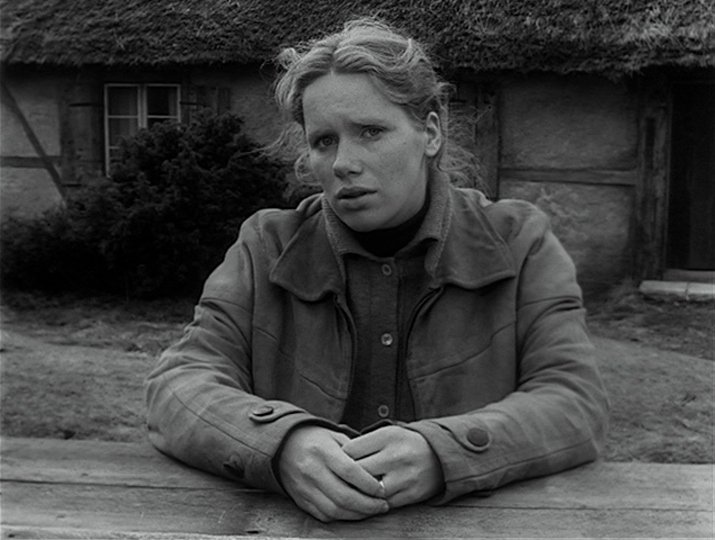
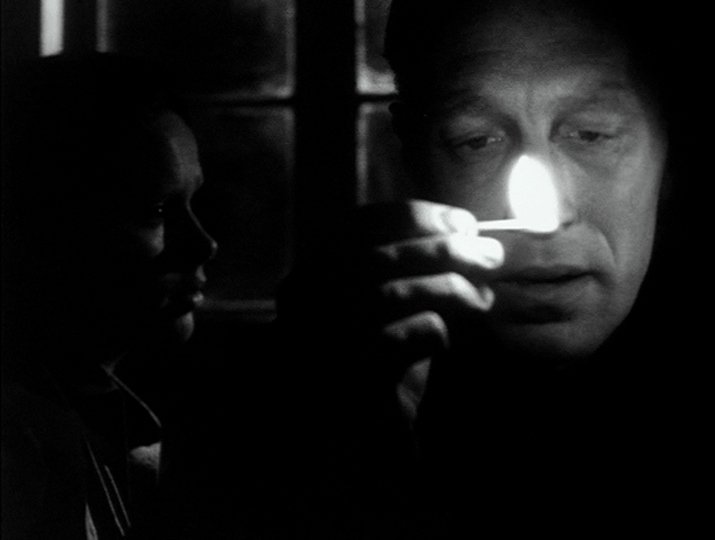
ohan: Eskiler buna 'kurdun saati' derlerdi. Insanlarin en cok oldugu ve dogdugu saat. Bu, kabuslarin bize geldiği zaman. Ve eger uyumamissan... / The old ones called it 'the hour of the wolf'. It is the hour when most people die, when most children are born. Now is when nightmares come to us. And if we are awake...
Alma: Korkariz. / We're afraid.
Johan:Korkariz. / We're afraid.
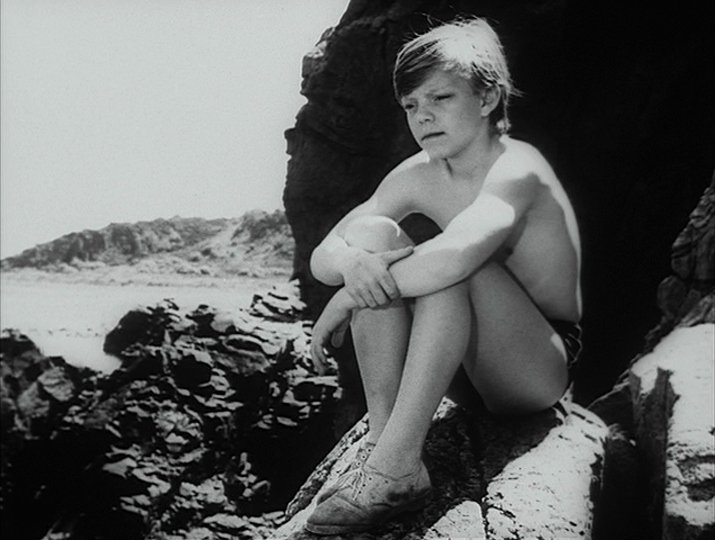
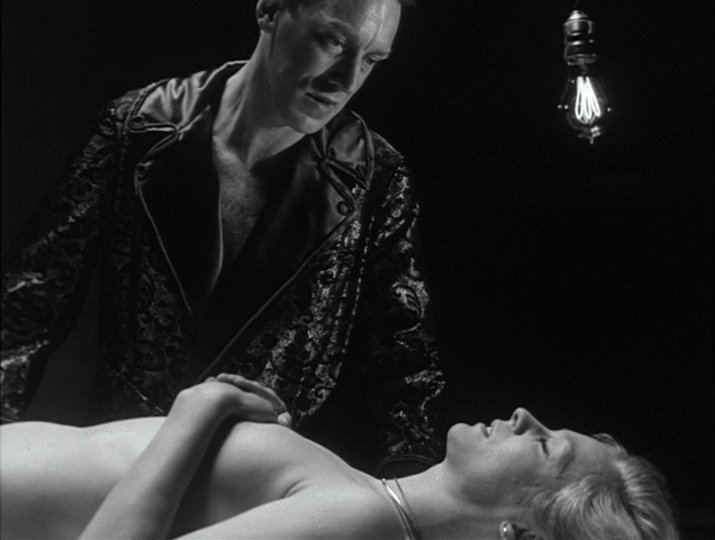

Kurtlarin Saati (Hour of the Wolf - Vargtimmen, 1968) Yonetmen: Ingmar Bergman
 Gönderi Kuralları
Gönderi Kuralları
- Yeni konu açamazsınız
- Konulara cevap yazamazsınız
- Yazılara ek gönderemezsiniz
- Yazılarınızı değiştiremezsiniz
-
Forum Rules




Yer İmleri